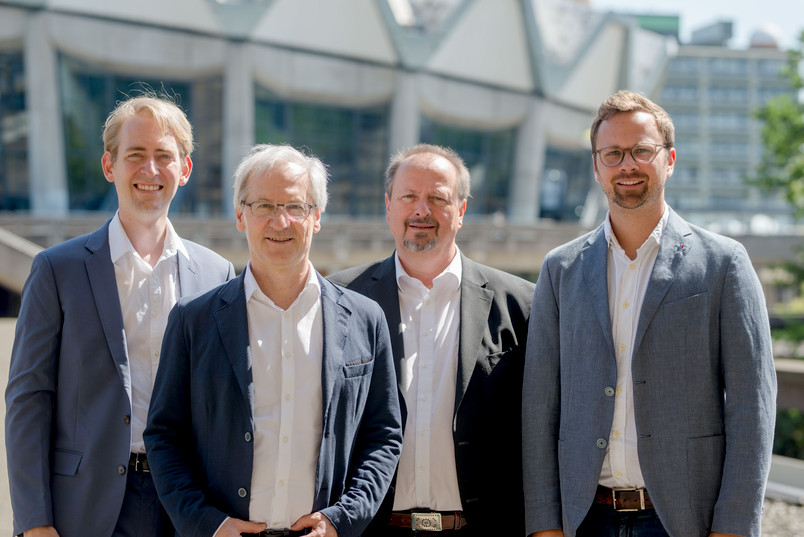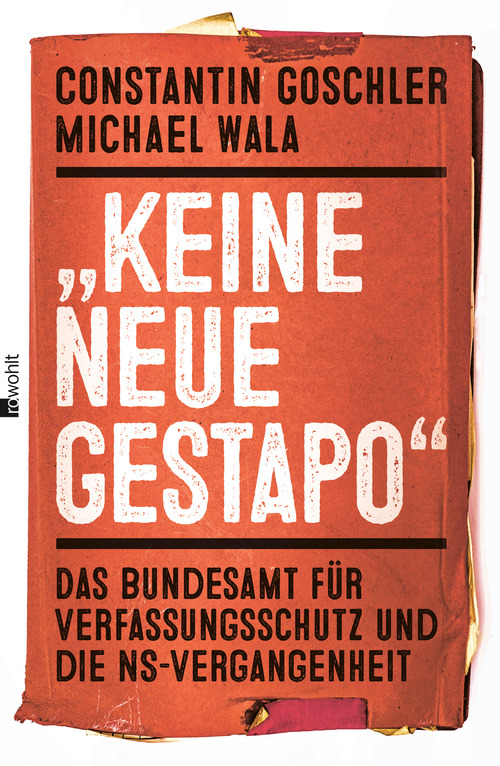About us
The research project "Security and and the Public Sphere" at the Department of History at the Ruhr-Universität Bochum focuses on changing security concepts within modern societies with a particular attention to areas of tension between secrecy and transparency, privacy and the public sphere, in national as well as international contexts. Researching governmental and non-governmental intelligence and security services in Germany, Europe, and the United States, interactions between political, social, and technical/technological developments defining security-cultures in liberal societies in the 20th and early 21st century as well as the transatlantic security-architecture will be at the center of scholarly investigation.Thus, the research project combines traditional security concepts prominent in historical research of international relations with the social-constructivist and historic-cultural approaches anchored in a contemporary history of security.
The Research Project is supervised by Prof. Dr. Constantin Goschler and Prof. Dr. Michael Wala.
News
New Research Projekt
„Das Bundesamt für Verfassungsschutz, das Ministerium für Staatssicherheit und die Spionageabwehr im Kalten Krieg“
Prof. Wala is currently researching the Bundesamt für Verfassungsschutz’s (BfV) counterintelligence activities during the Cold War in an independent, critical, as well as context oriented research project.
The project is spanning the period between 1950 and 1990, concentrating on the BfV's work against the GDR Ministry for State Security's (MfS) espionage activities.
It will encompass an organizational history of the BfV's counterintelligence unit, its integration in the changing political and societal landscape of the Federal Republic as well as in the Cold War's transatlantic security network.
Based on this, the operational work of the counterintelligence unit will be analyzed.
Starting in February 2019, the research project will be conducted until July 2021.
Its results will be published.
Additional information can be found here.
New DFG Project
Security, Democracy and Transparency. NADIS, HYDRA and the Beginnings of Electronic Data Network Systems in the Federal Republic of Germany and the USA
From the summer of 2018 on the “Deutsche Forschungsgemeinschaft” (DFG) is financing an extensive research project dealing with data processing systems that secret Intelligence Services conducted from the 1960s up until the 1980s. The project is part of the research focus “Security and the Public” and was initiated by Professor Michael Wala (North American History) and Professor Constantin Goschler (Contemporary History). The project’s main focus lies on the central conflict in liberal democracies between security agencies collecting private data to fulfil governments’ obligation to provide for security and the publics’ demands for protection of their private information. This conflict then results in a strained relationship affecting the publics’ confidence in democratic institutions as well as the social and political processes of negotiation about adapting this structural asymmetry of conflicting demands for transparency.
 © RUB, Marquard
© RUB, Marquard
Dr. Jens Wegener is already working on this project as a PostDoc at the chair for North American History, Christopher Kirchberg (Contemporary History) is joining Dr. Wegener in autumn.
Here you can also find the Ruhr-University’s press release, a radio interview with Professor Wala and a newspaper report with Professor Goschler on the start of the project.
DFG Research Project
Western Allied Intelligence Services and Former Members of the Waffen-SS, Gestapo and Wehrmacht in the Early Cold War. Cooperation, Networks, Communication Strategies.
The research project, directed by Prof. Wala, North American History with its research focus on "Security and the Public", analyses processes of information acquisition and knowledge construction by American intelligence services with respect to the, at the end of World War II, still obscure enemy USSR. Based on preliminary research made possible by a Mercator Research Center Ruhr (MERCUR) grant, the project will focus on how former members of the SS-, Gestapo, and Wehrmacht utilized their position within the knowledge and interpretation markets during the immediate postwar period to shift threat perceptions from former members of the NS-regime onto Communists and Soviet spies, thus obscuring themselves as possible past and present adversaries. Lutz Heilmann, M.A. will serve as researcher for this project.
Conference "Creating and Challenging the Transatlantic Intelligence Community"
The international conference "Creating and Challenging the Transatlantic Intelligence Community", organized by Prof. Michael Wala
and hosted at the Woodrow Wilson Center and the German Historical Institute in Washington D.C. from March 30 through April 1, 2017, can be pleased about a highly positive response.
On October 24, 2016, Prof. Michael Wala and Prof. Constantin Goschler participated in the conference "Negotiating Security in Europe and the United States" at the
"German Center for Research and Innovation" in New York. A video of all presentations has now been published online.
In connection with the series of murders by the National Socialist Underground (NSU), the Federal Office for the Protection of the Constitution (Bundesverfassungsschutz, BfV) was criticized
for turning a blind eye to right-wing extremism. This stemmed from the fact that during its founding phase the office was highly influenced by former members of the NSDAP. Are those assumptions valid?
Historians Constantin Goschler and Michael Wala have researched the first 25 years of the Federal Office for the Protection of the Constitution by evaluating so far classified documents.
Now for the first time one can estimate more precisely how many employees with a Nazi past did actually work at the BfV and which influence they exerted on its development.
Additionally, the book examines the scopes of action of the BfV while being under allied controll, its role during the Cold War and in connection with the "domestic security" as well as its numerous scandals.
One thing is clear: as political players and the BfV changed their perception of potential security threats, the German public also revised its perception of the BfV itself which was seemore and more as an endangerment.
Against this background the book also reflects the historical development of the political culture from the Adenauer period through the social-liberal era.Conference video: "Negotiating Security in Europe and the United States"
Current Publications

